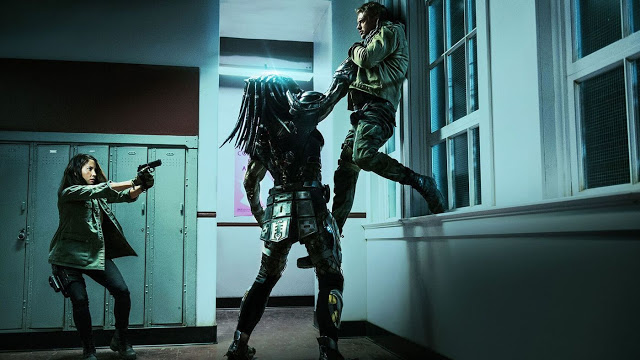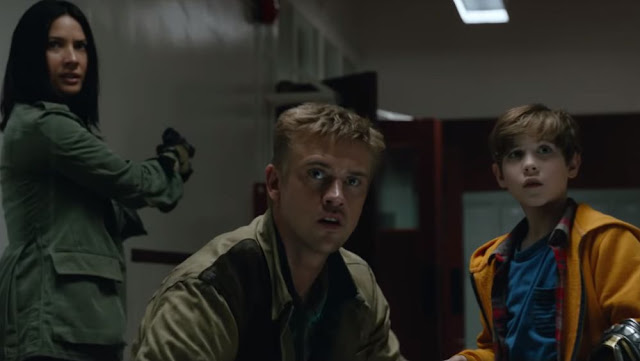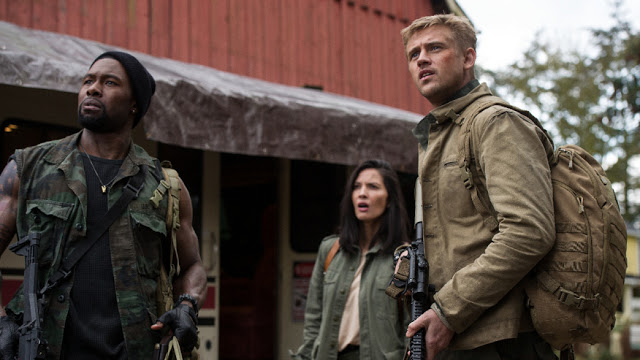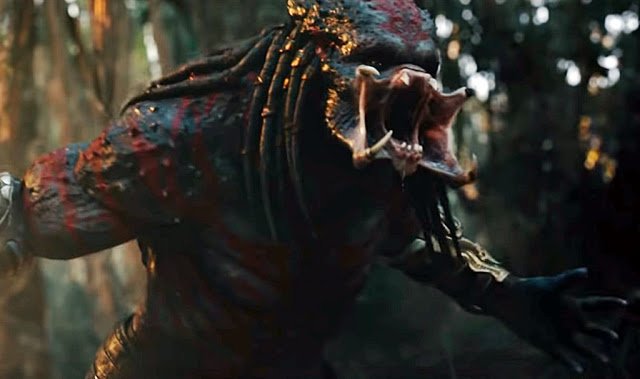The eponymous monster of The Predator is very good at one thing, and it’s killing people. Shane Black, the director and co-writer of The Predator, is also very good at one thing, and it’s writing smart, quippy dialogue. But where the Predator is single-minded in its focus—it kills with precision and without mercy—Black is less committed to channeling his energies into his strengths. He’s great with words, but he also loves mayhem, and after appearing as an actor in the original Predator in 1987, he’s clearly overjoyed at the opportunity to take ownership of this franchise as it continues to slice limbs and spill blood. It’s hard to blame him for following his heart, but his ambition can’t match his execution, because as gifted as Black is with masculine banter, he is not an especially skilled director of action.
This is a problem, because The Predator, for all its verbal wit, is an action movie. It is constructed as a series of explosive set pieces, with periodic interruptions for bouts of exposition and exchanges of vulgar, good-natured ribbing. It’s a reliable formula that Black helped create—he penned a number of big-budget screenplays in the ’80s and ’90s, including Lethal Weapon, The Last Boy Scout, and The Long Kiss Goodnight—though where his earlier scripts tended to be complex to the point of indecipherability, this one (co-written by his old collaborator Fred Dekker) is blunt and purposeful. There’s a murderous alien on the loose in suburbia. A cadre of shady bureaucrats want to capture it, a band of hardy soldiers want to kill it, and a few hapless innocents—embodied by an exasperated biologist (Olivia Munn) and a 10-year-old autistic boy (Jacob Tremblay)—find themselves caught in the crossfire.
It’s arguably ironic that, for a film about aliens, the plot of The Predator is decidedly earthbound. But there’s nothing inherently wrong with familiarity, and as a matter of structure, the movie is well-paced and lucid. It quickly introduces us to its assortment of swaggering characters, led by McKenna (Boyd Holbrook), a salty sniper who improbably incapacitates the Predator during one of those blurry nighttime raid sequences where anonymous soldiers get eviscerated and a phantom threat lurks in the middle distance. McKenna escapes, but he’s soon hauled in for questioning by the feds, who are commanded by the unscrupulous Traeger (a fantastic Sterling K. Brown). McKenna soon learns that Traeger and his cronies are studying the captured beast in a lab, a foolproof plan that couldn’t possibly go wrong. (Unlike Black, these G-men do not appear to have seen very many ’80s action movies.)
After the typical turmoil—the spiking of heart-rate monitors, the breaking of shackles, the sudden dousing of an antiseptic white floor with gooey red liquid—McKenna finds himself on a prison transport bus, at which point The Predator finds its rhythm. The bus houses a coterie of reprobates and criminals who also happen to be former Marines. They include Williams (Moonlight’s Trevante Rhodes), a relaxed warrior who may harbor a silent death wish; Nettles (Augusto Aguilera), a soft-spoken pilot; Lynch (Alfie Allen), a tracker who’s good with card tricks; and the oil-and-water duo of Coyle (Keegan-Michael Key) and Baxley (Thomas Jane), who respectively provide and absorb insults as though they’re at a roast. Scarcely a minute after McKenna has taken his seat, Coyle is asking Baxley an explicit rhetorical question involving a homeless man, circumcision, and his mother.
I wouldn’t dare spoil the punch line to such a sophisticated joke, but while it may be in poor taste, it’s also funny. And as a testosterone-laced comedy, The Predator is sharp and successful. In Black’s works, the overarching stories tend to be incidental; whether it’s the superhero chaos of Iron Man 3 or the private-eye hijinks of The Nice Guys, he’s less interested in what his characters do than in what they say, which means they’re constantly spitting out barbs like ballplayers chewing tobacco. (His best movie, Kiss Kiss Bang Bang, works in part because its hero is mostly clueless about the labyrinthine plot he’s ensnared in.) That’s why, as loud and violent as The Predator is, it’s at its best when it turns down the volume and simply lets it jocks (and its ladies—in addition to Munn, Yvonne Strahovski plays McKenna’s plucky estranged wife) casually tease one another.
The cast helps. On Narcos, Holbrook had the misfortune of playing the show’s de-facto narrator opposite Wagner Moura’s more interesting and charismatic Pablo Escobar; the same is somewhat true here—McKenna isn’t exactly a memorable character—but Holbrook is at least able to give him some wisecracking soul. As his compatriots, Rhodes is effortlessly watchable, while Key and Jane demonstrate an antagonistic chemistry that is ultimately revealed to camouflage a deep friendship. Munn, who gets to do far more here than she did in X-Men: Apocalypse, seems to enjoy while playing with the boys, while Tremblay is given the chance to discover the joys of profanity. The clear highlight, however, is Brown, a tremendously sensitive actor who here takes evident relish in playing a man without a conscience.
Then again, the main attraction in The Predator is, well, the Predator. (“Technically, it’s more of a hunter.” “We took a vote, Predator’s cooler.”) Created by a combination of CGI and the body of 6’10” stuntman/parkour specialist Brian A. Prince, it’s basically a souped-up version of the ’87 creature, with long dreadlocks, some nifty armor, and one ugly mug. He’s a cool-looking dude, complete with cloaking technology and special thermal vision, but Black has no idea how to effectively put him in motion. As a result, the film’s action sequences are noisy, messy, and bloody, exhibiting neither tangible weight nor spatial coherence; they mostly involve screaming men shooting high-powered rifles at a seemingly indestructible foe. When standing still and snarling, the Predator is plainly a threatening presence, yet Black fails to translate that menace into tension.
As The Predator progresses, the jokes dissipate and the gunfire intensifies, and Black’s deficiencies become increasingly apparent. One strand of the half-baked story involves aliens hybridizing through the integration of foreign DNA. And The Predator itself is a biological mongrel, incorporating strains of ’80s action flicks, old-school platoon pictures, outlaw-hero films, nerd-revenge fantasies, and conspiracy thrillers. Again, it’s hardly criminal to turn to the past for inspiration, and the movie features a few winking nods to the Schwarzenegger-led original; one character refers to the Predator as “one beautiful motherfucker”, while another shouts that they must get to the chopper. Those made me chuckle. But at some point, franchise continuations—whether they’re remakes, reboots, sequels, whatever—need an independent reason to exist beyond mere homage. Here, as the film’s humor quotient diminishes, so does the possibility that it might have the nerve to possess an actual identity.
One neat thing about the Predator is that it can make itself invisible, but even that’s just a temporary trick. And while this movie initially scans as a fresh spin on an old genre, that too proves to be an illusion. After a time, the disguise wears off, and you realize there’s actually nothing left to see.
Jeremy Beck is the editor-in-chief of MovieManifesto. He watches more movies and television than he probably should.




